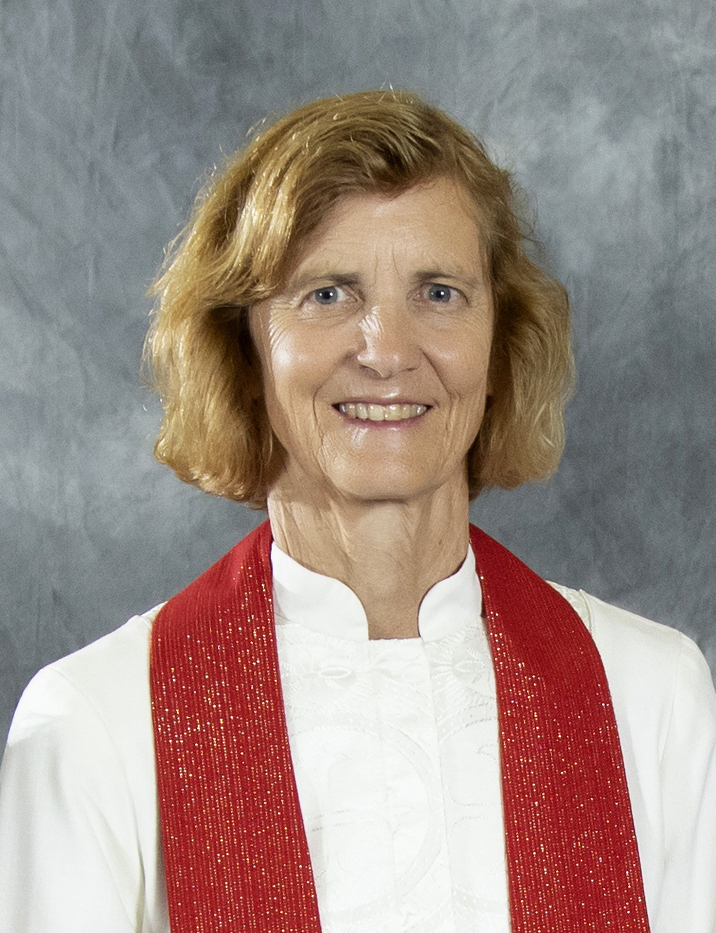Bishop Laurie Haller writes that she’s always impressed by seeing how athletes deal with pressure. She praised U.S. Olympic gymnast Simone Biles for courage in publicly acknowledging her own struggles.
LAURIE HALLER
Iowa Conference

The Olympics ended last week. What a joy it was for millions of people across the globe to watch the best athletes in the world compete for the gold. I was able to find time most days to admire the tenacity and commitment of each one of these athletes to their particular sport. Their stories have been inspiring! Over the years, I have been especially interested in how world-class athletes address performance anxiety, the knowledge that every time they make a mistake or do not perform to expectations, the athletes are open to criticism and potshots from others, not to mention their own disappointment.
Of course, performance anxiety transcends sports. I remember sitting in a corner of the stands before basketball games in high school with a pit in my stomach because I did not want to let my teammates down by playing poorly. In the years I spent studying the organ, I was terrified every time I gave a recital or played for worship. Even though I was usually well prepared, the jitters always seemed to have a way of getting to me. Then, there is leading worship. During the years I preached without notes, I became almost physically sick beforehand and would pray to God to help me get through it.
When our children were growing up, they all took piano lessons, and we would occasionally sing this song to each other, “Practice makes perfect.” Even though we humans “are fearfully and wonderfully made” (Psalm 139:14), and even though we may practice constantly, not one of us is perfect, and we will make mistakes.
Performance anxiety affects many of us. Maybe it’s sports. Maybe it’s reciting a poem. Maybe it’s the simple feeling that we are not good enough or are not cut out to be musicians, social workers, athletes, or teachers. The reality is that most people understand the stress that performers experience and are supportive when they make mistakes. However, we are also very aware of others who criticize everything we say or do and “show no mercy.”
I am deeply grateful to American gymnast Simone Biles for her courage to step away for a few days after only completing one rather than two and a half twists on the vault and stumbling on the landing. Saying that she was not mentally ready to perform again after experiencing the “twisties” (a sensation of being lost in the air), Biles instead chose to encourage and cheer on her teammates. “I just felt like it would be a little bit better to take a back seat, work on my mindfulness,” Biles said after the team competition, in which the United States took silver. “I didn’t want to risk the team a medal for, kind of, my screw-ups because they’ve worked way too hard for that.”
It was a joy to see Simone come back a few days later to win the individual bronze medal for the balance beam. Biles’ courage in admitting that performance anxiety affected her mental health and then courageously choosing to try again was inspiring. But even more, her decision to call out Olympic and governing body officials for not reporting allegations of sexual abuse by Larry Nasser and the abuse of hundreds of other gymnasts by coaches and other adults has inspired many to share their stories. In a July 28 tweet, Biles said, “The outpouring of love and support I’ve received has made me realize I’m more than my accomplishments and gymnastics, which I never truly believed before.”
In many ways, you and I are no different than Simone Biles. Of course, we will never experience the pressure of performing in the Olympics. However, as people of faith, both clergy and laity are called as disciples of Jesus Christ to live out our faith every day. It has been a particular challenge over these past 18 months to share the good news of the hope that is in us in the midst of the pandemic. I give thanks for God’s love in Jesus Christ, which is a constant reminder that we are far more than our achievements or failures. I thank God for the inner peace that assurance can bring.
Congregations have had to make difficult decisions to pause in-house worship to keep children and adults safe. We have had to forego choirs, face-to-face Bible studies, one-on-one pastoral care, and small groups in favor of virtual meetings. And we have had to find other ways to observe sacramental occasions such as baptisms, holy communion, weddings, and funerals. Our clergy, in particular, have carried a heavy load, as they have had to reinvent their ministries continuously. I thank God that, amid all these challenges, the Holy Spirit empowers us to continue to reach out with faith, hope, and love creatively.
As we move through summer into the fall and as the COVID-19 Delta variant is currently straining our healthcare system, I encourage you to continue to take appropriate precautions, gently care for one another, and not be too hard on yourself. Biles said that even before the Olympics began, she was under so much pressure that it felt “like the weight of the world on your shoulders.” She told NBC’s Hoda Kotb that the feeling could be “very overwhelming” and a “little bit too heavy to carry,” but it helps to take a step back and focus on her mental health as she did in Tokyo.
I thank God for each one of the 206 countries in the International Olympic Committee and the 11,091 athletes who participated in 41 different sports and 339 events. You have not only entertained us, but you have demonstrated the Olympic Spirit by doing the very best you can and supporting one another in the process.
~ Bishop Laurie Haller was an Elder in the West Michigan Conference when she was elected bishop in 2016. She now serves the Iowa Conference, with an interim assignment to the Dakotas.
Last Updated on September 20, 2022

